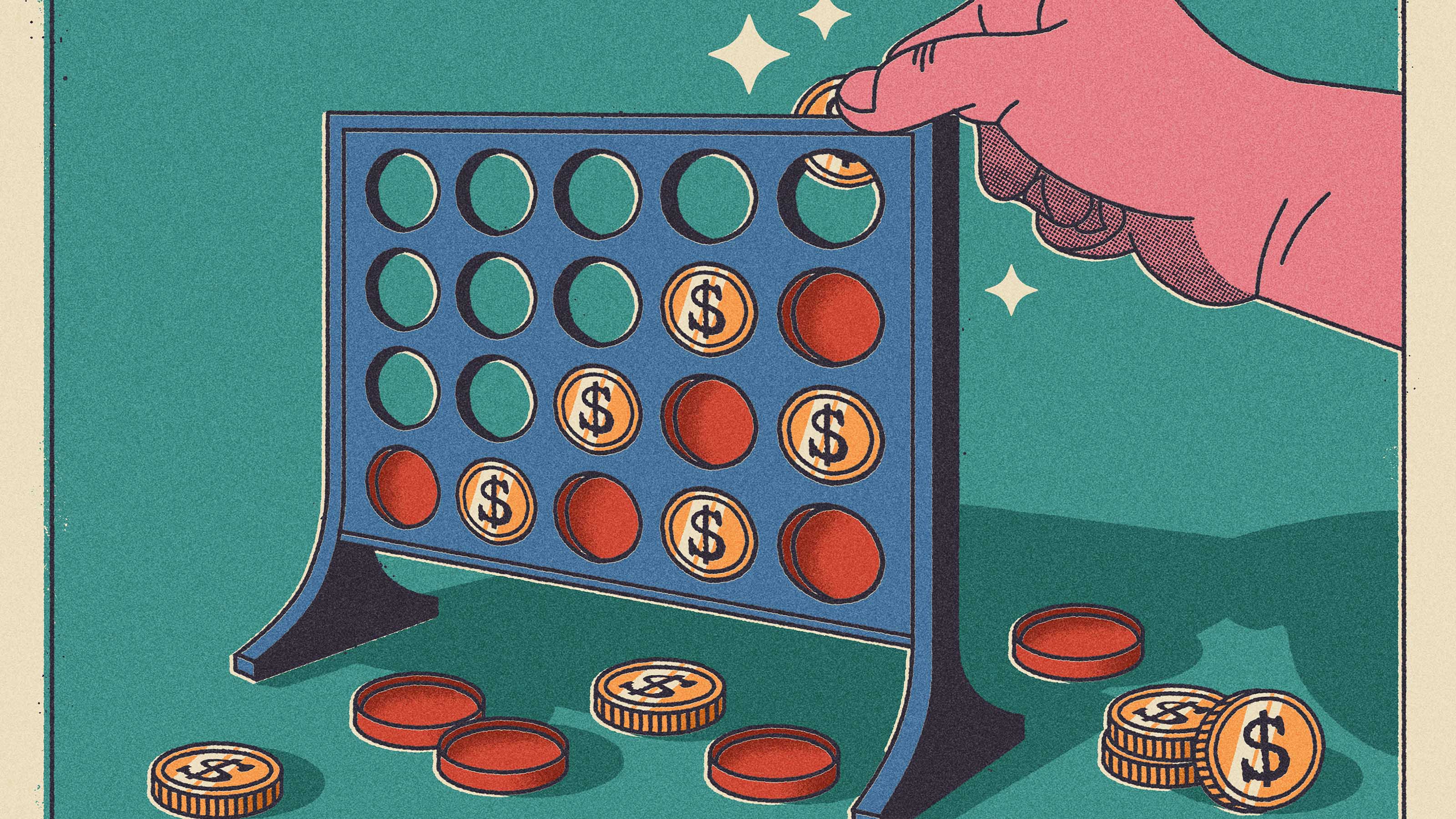Investors, Don't Let Current Events Spook You
It may seem like you’re facing the storm of the century every time you turn on the news, but the markets have survived far worse.


Profit and prosper with the best of Kiplinger's advice on investing, taxes, retirement, personal finance and much more. Delivered daily. Enter your email in the box and click Sign Me Up.
You are now subscribed
Your newsletter sign-up was successful
Want to add more newsletters?

Delivered daily
Kiplinger Today
Profit and prosper with the best of Kiplinger's advice on investing, taxes, retirement, personal finance and much more delivered daily. Smart money moves start here.

Sent five days a week
Kiplinger A Step Ahead
Get practical help to make better financial decisions in your everyday life, from spending to savings on top deals.

Delivered daily
Kiplinger Closing Bell
Get today's biggest financial and investing headlines delivered to your inbox every day the U.S. stock market is open.

Sent twice a week
Kiplinger Adviser Intel
Financial pros across the country share best practices and fresh tactics to preserve and grow your wealth.

Delivered weekly
Kiplinger Tax Tips
Trim your federal and state tax bills with practical tax-planning and tax-cutting strategies.

Sent twice a week
Kiplinger Retirement Tips
Your twice-a-week guide to planning and enjoying a financially secure and richly rewarding retirement

Sent bimonthly.
Kiplinger Adviser Angle
Insights for advisers, wealth managers and other financial professionals.

Sent twice a week
Kiplinger Investing Weekly
Your twice-a-week roundup of promising stocks, funds, companies and industries you should consider, ones you should avoid, and why.

Sent weekly for six weeks
Kiplinger Invest for Retirement
Your step-by-step six-part series on how to invest for retirement, from devising a successful strategy to exactly which investments to choose.
My husband, Sean, is a methodical guy who carefully weighs all possibilities before acting. So when he broached the idea of selling all of his stocks because of his concerns about both market valuations and geopolitical uncertainties, ranging from North Korean bluster to neo-Nazis marching in Virginia, I thought it might be time to take a step back and discuss when—if ever—it’s advisable to sell everything.
First, let me state the obvious: Nuclear war would not be good for your stock holdings. That said, if such a conflagration were to occur, we’d all probably have better things to do than worry about our portfolios.
Armageddon aside, a couple of things could spur you to dump all of your stocks. If you have enough money to live on for the rest of your life—even if your investments don’t come close to keeping pace with inflation—and stocks make you nervous, sell. After all, the goal of accumulating wealth is to make you calm and comfortable. If you’ve aced comfortable, and holding stocks is interfering with the calm, get out.
From just $107.88 $24.99 for Kiplinger Personal Finance
Become a smarter, better informed investor. Subscribe from just $107.88 $24.99, plus get up to 4 Special Issues

Sign up for Kiplinger’s Free Newsletters
Profit and prosper with the best of expert advice on investing, taxes, retirement, personal finance and more - straight to your e-mail.
Profit and prosper with the best of expert advice - straight to your e-mail.
In addition, if you have some looming financial obligation that could require every bit of your savings, you should not be in stocks. Because the stock market is notoriously volatile and unpredictable over the short term, money that you will need in the next year or two should be in safe vehicles, such as bank accounts and money market funds.
Sell everything? What about getting out temporarily and reentering the market when things look better? If market timing were so simple, we’d all be billionaires. But make a mistake and your results suffer big-time. For example, if 10 years ago you had invested in a low-cost fund that mimicked Standard & Poor’s 500-stock index, you would have earned 7.7% annualized (despite having suffered through the devastating 2007–09 bear market). But if you had missed the stock market’s 10 best days, you would have barely broken even, according to Morningstar.
So what do you do when you’re spooked about current events? You review your investment goals and make sure that your portfolio is properly structured to achieve them. For instance, you should have enough cash—typically six to 12 months’ worth of living expenses—to handle emergencies and address near-term financial goals.
Bonds and CDs are good for funding medium-term goals, such as buying a house or car. Real estate—both the home you live in and real estate investment trusts, which own different kinds of commercial properties—are good inflation hedges. After all, the rents that REITs collect from tenants are likely to rise with inflation.
The rest of your money—the savings aimed at funding goals in the distant future—should be heavily invested in U.S. and foreign stocks. Over the past 90 years, according to Morningstar’s Ibbotson unit, shares of large U.S. companies have earned average annual returns of roughly 10%, handily beating the rate of inflation and boosting investors’ long-term buying power.
Adverse news—whether it’s the threat of war or negative economic developments (which, in truth, have been in short supply lately)—will always buffet the stock market. It’s worth noting, though, that over the 90-year period tracked by Ibbotson, we have endured a world war, the Korean War, Vietnam, Watergate, 9/11, the Great Depression, the Great Recession and numerous milder economic downturns. In other words, although it may feel as if you’re facing the storm of the century every time you turn on the news, the world and the financial markets have seen worse and survived.
It’s normal to be worried in tumultuous times. But worries should make you check your course, not change it.
Profit and prosper with the best of Kiplinger's advice on investing, taxes, retirement, personal finance and much more. Delivered daily. Enter your email in the box and click Sign Me Up.

-
 The Cost of Leaving Your Money in a Low-Rate Account
The Cost of Leaving Your Money in a Low-Rate AccountWhy parking your cash in low-yield accounts could be costing you, and smarter alternatives that preserve liquidity while boosting returns.
-
 I want to sell our beach house to retire now, but my wife wants to keep it.
I want to sell our beach house to retire now, but my wife wants to keep it.I want to sell the $610K vacation home and retire now, but my wife envisions a beach retirement in 8 years. We asked financial advisers to weigh in.
-
 How to Add a Pet Trust to Your Estate Plan
How to Add a Pet Trust to Your Estate PlanAdding a pet trust to your estate plan can ensure your pets are properly looked after when you're no longer able to care for them. This is how to go about it.
-
 The Most Tax-Friendly States for Investing in 2025 (Hint: There Are Two)
The Most Tax-Friendly States for Investing in 2025 (Hint: There Are Two)State Taxes Living in one of these places could lower your 2025 investment taxes — especially if you invest in real estate.
-
 The Final Countdown for Retirees with Investment Income
The Final Countdown for Retirees with Investment IncomeRetirement Tax Don’t assume Social Security withholding is enough. Some retirement income may require a quarterly estimated tax payment by the September 15 deadline.
-
 How to Beef Up Your Portfolio Against Inflation
How to Beef Up Your Portfolio Against Inflationinvesting These sectors are better positioned to benefit from rising prices.
-
 Taxable or Tax-Deferred Account: How to Pick
Taxable or Tax-Deferred Account: How to PickInvesting for Income Use our guide to decide which assets belong in a taxable account and which go into a tax-advantaged account.
-
 Smart Investing in a Bear Market
Smart Investing in a Bear Marketinvesting Here's how to make the most of today’s dicey market.
-
 How to Open a Stock Market Account
How to Open a Stock Market Accountinvesting Investing can be fun, but you need a brokerage account to do it. Fortunately, it’s easy to get started.
-
 The Right Dividend Stock Fund for You
The Right Dividend Stock Fund for YouBecoming an Investor Dividend stock strategies come in many different flavors. Here's what to look for.
-
 Alternative Investments for the Rest of Us
Alternative Investments for the Rest of UsFinancial Planning These portfolio diversifiers aren't just for the wealthy.